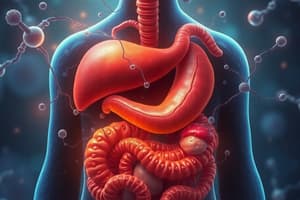Podcast
Questions and Answers
What is the main purpose of digestion in living organisms?
What is the main purpose of digestion in living organisms?
- To replicate DNA
- To absorb sunlight for photosynthesis
- To produce energy for cells
- To break down food into basic components (correct)
Which systems closely regulate the digestive processes in humans?
Which systems closely regulate the digestive processes in humans?
- Circulatory and Skeletal Systems
- Muscular and Excretory Systems
- Nervous and Endocrine Systems (correct)
- Respiratory and Lymphatic Systems
How does mechanical digestion differ from chemical digestion?
How does mechanical digestion differ from chemical digestion?
- Mechanical digestion only occurs in the mouth, while chemical digestion occurs in the stomach.
- Mechanical digestion breaks food down chemically, while chemical digestion breaks it down physically.
- Mechanical digestion involves enzyme action, while chemical digestion involves physical movements.
- Mechanical digestion breaks food down physically, while chemical digestion breaks it down chemically. (correct)
Which of the following is NOT a part of the human digestive system?
Which of the following is NOT a part of the human digestive system?
Where does peristalsis occur in the digestive system?
Where does peristalsis occur in the digestive system?
What role does saliva play in the digestive process?
What role does saliva play in the digestive process?
Where does the breakdown of complex carbohydrates to simple sugars begin?
Where does the breakdown of complex carbohydrates to simple sugars begin?
What is the primary role of the small intestine in digestion?
What is the primary role of the small intestine in digestion?
Which enzyme breaks down fats in the small intestine?
Which enzyme breaks down fats in the small intestine?
What is the main function of the large intestine in digestion?
What is the main function of the large intestine in digestion?
Which system plays a crucial role in regulating digestion by transmitting signals to and from the central nervous system?
Which system plays a crucial role in regulating digestion by transmitting signals to and from the central nervous system?
What is a common function of enzymes in digestion?
What is a common function of enzymes in digestion?
Study Notes
Life Processes: Exploring Digestion
Digestion is a fundamental life process that all living organisms, from single-celled bacteria to complex multicellular animals like us, undergo. It's the process by which we break down food into its basic components, making them available for absorption and utilization by our cells. Understanding digestion will not only deepen our appreciation for this vital process but also help us appreciate the marvels of life.
The Digestive System: An Overview
The digestive system includes organs and structures that work together to ensure efficient digestion. In humans, the main organs involved are the mouth, pharynx, esophagus, stomach, small intestine, large intestine, and rectum. Few other organ systems intertwine as closely with the digestive system as the nervous and endocrine systems, as they regulate digestive processes through hormones and neural signals.
Mechanical and Chemical Digestion
Digestion has two main components: mechanical and chemical processes. Mechanical digestion breaks food down physically through the use of movements and contractions, such as chewing, agitation in the stomach, and peristalsis in the intestines. Chemical digestion breaks food down chemically using various enzymes and acids.
The Digestive Process: From Mouth to Rectum
Mouth and Pharynx
Food enters the digestive tract through the mouth, where mechanical processes like chewing and salivation occur. Saliva contains enzymes like amylase, which begins the breakdown of complex carbohydrates to simple sugars. The food then travels through the pharynx, which guides it into the esophagus.
Esophagus
The esophagus is a muscular tube that moves food from the pharynx to the stomach through a process called peristalsis. During peristalsis, the esophagus's inner walls contract and relax, pushing food downward into the stomach.
Stomach
In the stomach, the food is mixed with gastric juices, such as hydrochloric acid and digestive enzymes. These juices break down proteins, kill bacteria, and begin the digestion of carbohydrates. Gastric motility also occurs, where the stomach churns and contracts to mix the food thoroughly.
Small Intestine
The small intestine is the primary site of nutrient absorption. The food is broken down into its basic components by enzymes secreted by the pancreas and intestinal walls. The small intestine also contains microvilli, which increase the surface area for nutrient absorption, and villi, which contain capillaries that take up nutrients and transport them to the bloodstream.
Large Intestine
The large intestine, also known as the colon, absorbs water from the remaining food residue. The remaining waste products are stored in the rectum until they are expelled from the body through defecation.
The Role of Enzymes
Enzymes are biological catalysts that speed up the rate of chemical reactions, such as digestion. Some common digestive enzymes include pepsin (breaks down proteins in the stomach), amylase (breaks down carbohydrates in the mouth), lipase (breaks down fats in the small intestine), and maltase (breaks down maltose in the small intestine).
Regulation of Digestion
The nervous and endocrine systems play crucial roles in regulating digestion. Nerves in the digestive tract transmit signals to and from the central nervous system, while hormones produced by the digestive system and other organs, such as insulin and gastrin, regulate digestion.
Digestion is a complex process that requires coordination between multiple systems and organs. Understanding this process provides us with insight into maintaining good health, preventing digestive issues, and appreciating the marvels of life.
Studying That Suits You
Use AI to generate personalized quizzes and flashcards to suit your learning preferences.
Description
Test your knowledge about the fundamental life process of digestion, from the mouth to the rectum, including mechanical and chemical aspects. Learn about the organs involved, such as the stomach, small intestine, and large intestine, and understand the role of enzymes in breaking down food. Explore how the nervous and endocrine systems regulate digestion.




